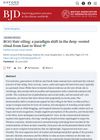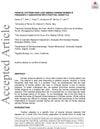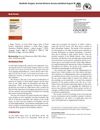8 citations,
November 2023 in “Social Science & Medicine” Gendered social factors, not just biology, contribute to sex differences in adverse drug events.
 7 citations,
July 2019 in “International archives of internal medicine”
7 citations,
July 2019 in “International archives of internal medicine” Common skin conditions can greatly affect a person's mental health and social life.
[object Object] 7 citations,
October 2018 in “South African journal of botany” Clausena anisata may be effective in treating acne due to its ability to fight bacteria, reduce inflammation, and possibly lower sebum production.
 6 citations,
August 2023 in “Fertility and Sterility”
6 citations,
August 2023 in “Fertility and Sterility” The 2023 guideline for PCOS suggests using updated diagnostic criteria, assessing related health risks, and recommends lifestyle changes and specific treatments for symptoms and fertility issues.
 6 citations,
August 2023 in “European journal of endocrinology”
6 citations,
August 2023 in “European journal of endocrinology” The 2023 guideline advises a detailed approach for PCOS, focusing on early detection, lifestyle and medical treatments, and managing health risks.
 3 citations,
October 2022 in “International Journal of Impotence Research”
3 citations,
October 2022 in “International Journal of Impotence Research” Testosterone Replacement Therapy can improve sexual health in postmenopausal women with low sexual desire, but more research is needed on its long-term effects.
3 citations,
January 2021 in “Journal of dermatology & cosmetology” Current alopecia treatments manage symptoms but don't cure, and better treatments are needed.
 1 citations,
March 2023 in “Nutrients”
1 citations,
March 2023 in “Nutrients” The conclusion is that obesity should be managed with a slow, balanced approach to diet and exercise, with medication and surgery as additional options, and education and access to care are important.
 1 citations,
June 2021 in “Journal of gynecology and womens health”
1 citations,
June 2021 in “Journal of gynecology and womens health” The study found that PCOS affects about 6.5-6.8% of women in both urban and rural areas of Telangana, India, and highlighted the importance of lifestyle changes for management.
The study on Ajuga reptans L. herb extracts highlights their rich phytochemical composition, including phenolic compounds, flavonoids, and amino acids, which contribute to their significant pharmacological activities. The extracts demonstrated strong antioxidant, anti-inflammatory, hepatoprotective, antimicrobial, and wound-healing properties. Notably, in a carbon tetrachloride-induced hepatitis model, the extracts showed protective effects on liver structure and function, with all treated animals surviving compared to a 16.7% mortality rate in the control group. The extracts also exhibited superior anti-inflammatory activity compared to quercetin and showed hemostatic effects by reducing bleeding time. Despite promising results, further research is needed to explore their clinical applications.
 December 2024 in “Nutrients”
December 2024 in “Nutrients” Skin, hair, and nail changes can help detect eating disorders early.
February 2024 in “IntechOpen eBooks” Proper nutrition can help manage PCOS symptoms and improve overall health.
 February 2024 in “BMC health services research”
February 2024 in “BMC health services research” Policymakers should integrate criteria like risk of harm, skills, qualifications, and teamwork to define allied health professions in Malaysia.
Hair proteins in preschool children and their mothers could indicate developmental changes and health status.
 November 2023 in “Australasian journal of dermatology”
November 2023 in “Australasian journal of dermatology” Dermatologists are essential in helping transgender and gender diverse patients with skin and hair issues related to gender affirmation and hormone therapy.
 November 2023 in “Plastic and Reconstructive Surgery – Global Open”
November 2023 in “Plastic and Reconstructive Surgery – Global Open” Americans see hair transplants as valuable for treating hair loss and want them to be more affordable and tailored to each gender.
[object Object]  August 2023 in “Medicina-lithuania”
August 2023 in “Medicina-lithuania” Abusing steroids can damage your heart, muscles, reproductive system, liver, skin, and brain, and may increase the risk of Alzheimer's disease.
 July 2023 in “Biodiversitas”
July 2023 in “Biodiversitas” Sundanese mothers in a rural village in West Java use plants for maternal care.
 October 2014 in “Our Dermatology Online”
October 2014 in “Our Dermatology Online” Parents often know about skin care, but children with less educated, lower-income parents have more skin problems.
 June 2024 in “British Journal of Dermatology”
June 2024 in “British Journal of Dermatology” Hair oiling has become popular in the West due to globalization and social media.
 6 citations,
November 2018 in “Dermatologic Therapy”
6 citations,
November 2018 in “Dermatologic Therapy” Wearing a ponytail often is linked to hair loss at the front of the scalp in Chinese women.
 September 2023 in “Cureus”
September 2023 in “Cureus” Early recognition and treatment of atypical alopecia areata in infants are crucial.
 13 citations,
August 2019 in “Journal of Ethnopharmacology”
13 citations,
August 2019 in “Journal of Ethnopharmacology” Eleven traditional Polynesian plants show potential for natural anti-aging, hair growth, and skin brightening products.
 40 citations,
July 2017 in “Frontiers in Medicine”
40 citations,
July 2017 in “Frontiers in Medicine” Early and personalized treatment for hair loss in young people is crucial to prevent permanent damage and should include psychological support.
July 2022 in “American Journal of Kidney Diseases” Cultural awareness in healthcare improves patient care and relationships.
 January 2014 in “International Journal of Trichology”
January 2014 in “International Journal of Trichology” Hair is culturally and economically valuable, and its weight is now used to measure the effectiveness of hair growth treatments.
 August 2015 in “Aesthetic Surgery Journal”
August 2015 in “Aesthetic Surgery Journal” The issue provides detailed guidance on ethnic considerations in facial plastic surgery, with high-quality visuals and useful information for practitioners, but could be more concise in some parts.
October 2020 in “M/C Journal” Society's view of "freaks" has shifted from natural deformities to extreme plastic surgery, reflecting changing beauty standards and pressures.
 48 citations,
July 2001 in “Clinics in Dermatology”
48 citations,
July 2001 in “Clinics in Dermatology” Cosmetics enhance beauty, fix defects, and intimidate enemies, with varying cultural standards and alternative methods.
 May 2018 in “Actas Dermo-Sifiliográficas”
May 2018 in “Actas Dermo-Sifiliográficas” The Spanish version of the Hair Specific Skindex-29 is a reliable tool for measuring quality of life in Spanish-speaking women with hair loss.





















